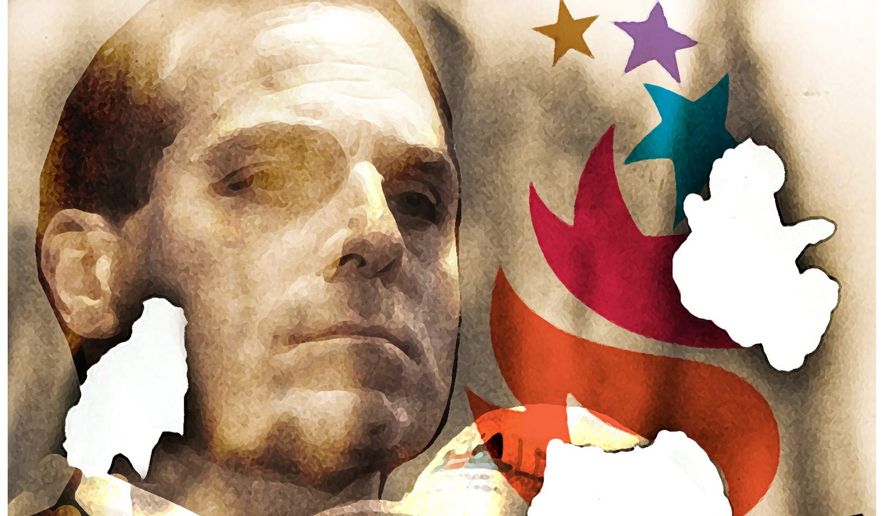OPINION:
If you want to know what really happened in the controversial case of Richard Jewell, who was a suspect in the 1996 bombing at the Olympics in Atlanta, don’t watch the new movie produced by Clint Eastwood.
Gripping though “Richard Jewell” is, it wrongly blames FBI case agents for bullying Jewell and leaking his name to the press as a suspect. The real culprit, whose misguided intervention and stubbornness led to the Richard Jewell debacle, was Louis Freeh, then the FBI director.
When a pipe bomb exploded at Centennial Olympic Park in Atlanta, the FBI became interested in Jewell, a security guard who had alerted police to a suspicious green backpack. Jewell appeared on TV to describe how he tried to evacuate the area before the bombing, which killed two people and injured over 100.
Citing unnamed sources, the Atlanta Journal-Constitution published a story saying Jewell was a suspect in the FBI’s investigation. That afternoon, FBI agents Don Johnson and Diader Rosario drove to Jewell’s apartment and asked him to come to the field office. If Jewell could clear up questions to the agents’ satisfaction, they planned to drop their interest in him.
Jewell agreed. But as the agents were reviewing Jewell’s background with him, Mr. Freeh called David W. “Woody” Johnson Jr., the FBI’s special agent in charge in Atlanta. Mr. Johnson was in his office down the hall from the room where Jewell was being questioned. With him were other SACs and Kent B. Alexander, the U.S. attorney in Atlanta.
Mr. Freeh said the agents should read Jewell his Miranda rights.
Any fresh agent out of the FBI Academy at Quantico knows that, based on a long line of court rulings, a suspect must be read his Miranda rights if he is in custody or is about to be arrested. Yet in Jewell’s case, neither was true.
As revealed in my book “The Secrets of the FBI,” Mr. Johnson pointed this out to Mr. Freeh, and Mr. Alexander told Mr. Freeh on the speaker phone he agreed with Mr. Johnson. But the director was adamant.
Robert M. “Bear” Bryant, who was about to be named deputy director under Mr. Freeh, was with the director when he made the call. A lawyer, Mr. Bryant also made the point to Mr. Freeh that Miranda rights were not required. Mr. Freeh wouldn’t listen and demanded that agents read Jewell his rights.
Woody Johnson walked down the hallway and pulled out the two agents who were successfully interviewing Jewell. He passed along Mr. Freeh’s instruction. The agents went back to the conference room and read Jewell his rights. Jewell said he would like to call an attorney, and that ended the interview.
“If we could have continued with Jewell, we could have confirmed what he told us and cleared him more quickly,” Woody Johnson told me.
Not until seven months after the incident did Mr. Freeh acknowledge in congressional testimony his own role in the fiasco. Pointing out that he had been a federal judge, Mr. Freeh said, “It is a matter of legal speculation whether a court would have ruled that Miranda warnings were required in Mr. Jewell’s case.”
Despite the fact that Jewell had gone there voluntarily, Mr. Freeh said he decided to order the warning “in an excess of caution” when he learned that the interview was “being conducted in a law enforcement structure [the FBI office].”
While the movie portrays an FBI case agent leaking Jewell’s name to Atlanta Constitution reporter Kathy Scruggs, who has since died, there is no basis for the claim. In fact, nine law enforcement agencies were aware that Jewell was one of dozens of suspects. After the movie premiered, Lin Wood, Jewell’s attorney, tweeted that evidence developed in lawsuits he filed against media organizations established that Scruggs’ boyfriend, who was a member of the Atlanta Police Department, tipped her off that Jewell was a suspect.
Three months after his FBI interview, the FBI cleared Jewell. It could have done so immediately if Mr. Freeh had not intervened and agents had been able to freely interview Jewell. In the opinion of the agents, Mr. Freeh was afraid that members of Congress would criticize him if Jewell had not been read his rights. Yet the FBI routinely interviews possible suspects in field offices without issuing Miranda warnings.
Eventually, fugitive Eric Robert Rudolph was charged with the bombing. He pleaded guilty and was sentenced to life in prison.
“For 88 days, I lived a nightmare,” Jewell, who died in 2007, said in tears at a press conference after being cleared.
The Jewell case was another in a series of FBI fiascoes that were directly attributable to Mr. Freeh, who was never mentioned in the movie. Almost every six months, a new debacle erupted. By imposing his will in areas he knew little about, Mr. Freeh disrupted the normal deliberative processes within the FBI. His emphasis was on making himself look good in the short run. In the long term, that approach damaged the credibility and reputation of the FBI.
• Ronald Kessler, a former Washington Post and Wall Street Journal investigative reporter, is the author of “The Secrets of the FBI.”




Please read our comment policy before commenting.